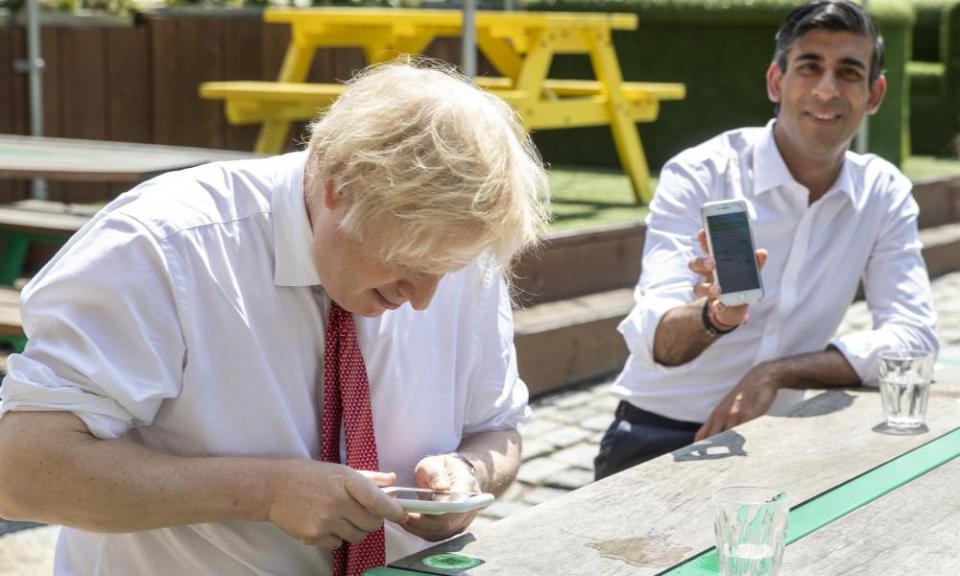No 10 to investigate text leaks from Boris Johnson’s personal phone
Watch: No 10 sources point finger at Cummings over Downing Street leaks
The Cabinet Office is to launch an internal investigation into the leak of Boris Johnson’s text messages with the billionaire businessman James Dyson after concerns were raised about the prime minister’s texted promises to change tax rules.
The announcement came as parliament’s most powerful committee of MPs will discuss whether to question Johnson on the use of his personal phone. Sources said the prime minister has liberally distributed his number over the years.
Johnson, who has had the same number for a decade, is regularly texted by business leaders and politicians, sources have said, though a loophole in the ministerial code means only meetings and not text messages need to be disclosed.
The Guardian reported on Wednesday that there were serious internal Downing Street concerns about his use of this phone, although No 10 has denied that the cabinet secretary, Simon Case, advised Johnson to change his number.

The extent of the concerns in Whitehall emerged after the prime minister was revealed to have texted the pro-Brexit billionaire Sir James Dyson last year, promising that his staff would not have to pay extra tax if they came to the UK to make ventilators during the pandemic. “I will fix it tomo! We need you. It looks fantastic,” Johnson wrote.
Johnson’s spokesperson said the decision had been made to launch an investigation into the leak, despite suggesting on Wednesday that there would be no inquiry. It will not examine a string of other leaks, including a text to the prime minister from the Saudi crown prince, Mohammed bin Salman, or leaked emails about donations solicited to cover the renovations of the prime minister’s flat.
“We have now decided to undertake this internal inquiry,” the spokesperson said. “As you would expect, we continually look at this and the position we decided today is that we want to make sure we have this internal inquiry into that.”
Related: Boris Johnson is ‘constantly lobbied’ by text, sources admit
It will be an internal Cabinet Office inquiry and will not involve the police or the security services. It is understood the texts from Dyson were forwarded to a number of officials and aides in Whitehall.
Johnson has promised to publish his text correspondence, in a reply to the SNP’s Westminster leader, Ian Blackford, at prime minister’s questions, though No 10 aides have not given any timeframe for that to happen.
Labour wrote to the chair of the liaison committee, Sir Bernard Jenkin, asking for the committee to question the prime minister on the use of his personal phone.
The committee, which is made up of all the senior MPs who chair other select committees, will take evidence from Johnson before the summer recess.
Watch: How to prevent getting into debt
Jenkin said the matter would be considered at the committee’s meeting on Thursday. “The prime minster is due to appear before the committee before the summer recess, and at that meeting committee members may question the prime minister on any matter,” he said.
The shadow minister for the Cabinet Office, Rachel Reeves, who wrote to Jenkin, said it was now essential Johnson make public all the correspondence he receives by text.
Reeves said: “Revelations today seem to confirm a growing feeling that if one has access to a telephone number of someone like the prime minister or the chancellor of the exchequer, then they are able to gain special treatment, potentially even significant financial ones.
“We need the prime minister to appear before the liaison committee immediately, and for a thorough investigation into his conduct on this matter. Boris Johnson should also stick to the commitment he made this week in prime minister’s questions and publish his text messages with other business leaders immediately.”
There is no requirement in the ministerial code to declare lobbying approaches made by text, and no clear guidance on whether the code covers virtual meetings. However, texts to the prime minister concerning government business are covered under freedom of information legislation.

 Yahoo News
Yahoo News 
